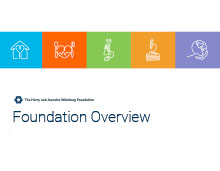Health
Good health is essential to help people move and remain out of poverty.
Poor physical or mental health can prevent or complicate the pursuit of education, employment, and other opportunities for economic mobility.
Priorities
The Foundation supports capital, program, and operating grants primarily in its priority communities in the following areas:
The Foundation supports organizations that provide access to health care, as well as those striving to improve patient health.
Examples of appropriate projects:
- Capital projects that expand access to primary care. Grantees are typically federally qualified health centers and other community health centers that provide a range of services in one place. Please note that the Foundation does not fund hospitals or free clinics.
- Oral and behavioral health programs that increase access to care through the construction of new facilities as well as operating support that leverages billing revenue.
- Health care transition programs that ensure young adults with developmental disabilities have access to qualified primary care providers as they move into adulthood.
The Foundation supports programs that enhance the mental wellness of veterans who are reintegrating into civilian life.
Examples of appropriate projects:
- Retreat programs, including an intensive on-site experience with a minimum of one year of follow-up. Programs must use a proven curriculum.
- Post-traumatic mental health therapy that is evidence-based and proven to reduce symptoms.
- Coordinated resource networks that facilitate access to a range of supportive services. These networks have a single access point that evaluates veterans and connects them with the most appropriate service providers.
The Foundation supports organizations and programs that increase food security and access to nutritious food.
Examples of appropriate projects:
- Meal service programs that ensure people who are homebound and living with severe, chronic illnesses have access to nutritious food.
- Food delivery programs, including nonprofit grocery stores, which increase access to healthy foods in food deserts.
- Food bank expansions and other capital projects that increase warehouse space, add cold storage and handling, and make other modifications necessary to serve more people. Please note that the Foundation focuses on regional food banks and not on food pantries or feeding programs.
The Foundation supports programs that promote family safety and that reduce the long-term traumatic effects of abuse and neglect, sexual assault, intimate partner or family violence, and exposure to community violence.
Examples of appropriate projects:
- Domestic violence programs that provide safe shelter, counseling, legal assistance, and other support services.
- Prevention and treatment programs that strive to reduce and alleviate the effects of child sexual and physical abuse, child trafficking, and child neglect.
I can kind of describe it as family….Peace of mind is me knowing that we’re taken care of. I’m not traveling 30 minutes to get the care that we need.

Apply for a Grant
The Foundation has an online application process for all capital, program, and operating grant requests. To learn more about how to apply, including eligibility, click the link below.
If you have a visual impairment or any difficulty in navigating our grants intake tool, please email grantsintake@hjweinberg.org. We will be pleased to assist you.
Key Initiative
- Community Health Centers
The Foundation supports federally qualified health centers across its priority communities to expand access to dental and behavioral health care, funding the renovation, expansion, and operational support of these facilities and allowing them to serve a greater number of patients. This has been particularly important in Hawai‘i and rural areas where access is severely limited.
Contact Information
If you have any questions, or require any additional information regarding the grant process, please contact grantsintake@hjweinberg.org.
